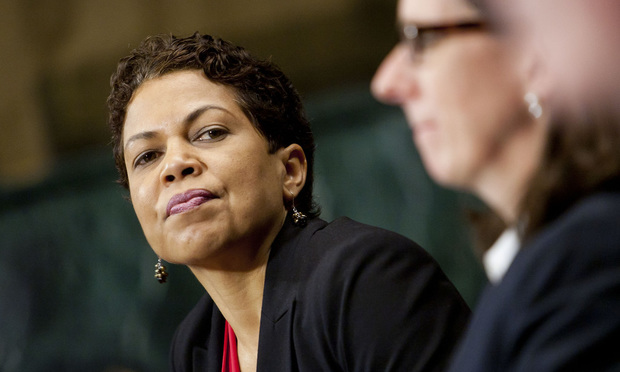Judge's Pay-Data Ruling, a Trump Rebuke, Puts New Squeeze on Employers
"I imagine there are a lot of questions being posted and everyone is trying to figure out what this means,” one labor and employment lawyer says.
March 06, 2019 at 01:20 PM
6 minute read
A Washington judge's order reinstating an Obama-era rule that requires greater disclosure of private workforce pay data has put new pressure on employers and management-side lawyers, as a deadline to comply with the regulation approaches and uncertainty lingers over whether the government will challenge the ruling.
The Trump administration failed to provide sufficient reasoning to block enforcement of the new pay-data reporting rule, U.S. District Judge Tanya Chutkan of the District of Columbia said in her decision this week. The regulation, which requires disclosure of pay information based on gender, race and ethnicity, was adopted by the U.S. Equal Employment Opportunity Commission as one measure to spotlight and combat pay disparities.
Chutkan's order means that employers with more than 100 workers must comply with the new reporting requirement by May 31. The EEOC has not said whether the agency will try to extend the deadline, and the U.S. Justice Department has not indicated whether the government will try to quickly appeal the ruling. The National Women's Law Center was a plaintiff in the case, filed in 2017 after the Trump administration scuttled the pay-data rule.
Labor and employment specialists are now faced with advising corporate clients whether and how to comply with the reinstated rule, which companies had long resisted as burdensome and potentially an open invitation for lawsuits confronting alleged workplace disparities.
“Right now, my advice for employers is to hit pause,” said Guy Brenner, a Proskauer Rose labor and employment partner in Washington. “No one thought they would have to submit this report and this is not an insignificant burden. I imagine there are a lot of questions being posted and everyone is trying to figure out what this means.”
U.S. government lawyers who defended the block on the new rule had cautioned Chutkan against any reinstatement, saying such a move “could upset the current expectation of filers, who may not be aware of this litigation nor its potential impact on their obligation.”
 U.S. District Judge Tanya S. Chutkan. Credit: Diego M. Radzinschi / ALM
U.S. District Judge Tanya S. Chutkan. Credit: Diego M. Radzinschi / ALMChutkan said the government's “speculation is unsupported by the record.” The judge said the revised pay data collection “had been in place for almost a year by the time it was stayed.” Companies, the judge said, “were on notice that the stay could be withdrawn at any time.”
Jenny Yang, a former EEOC chair during the Obama administration, said the revised form was crafted with the aim of encouraging employers to set compensation practices in a job-specific way and to help the agency fight a culture of secrecy about how much employees are paid.
“Pay data collection is long overdue,” Yang said. “We would have had the second year of data by the end of March if there hadn't been a delay in the process.”
In the backdrop of the case is an increasing spotlight on equitable pay in the United States, where reports show women make 80 cents on the dollar to men in comparable positions. There have been calls for increased transparency from federal, state and local lawmakers in recent years to address wage gaps.
The business community pushed back against the new pay-data reporting requirements, arguing they were onerous and would not properly address why there were gaps. Companies in recent years, in part sparked by the #MeToo movement, have begun to take on pay equity analyses and other efforts.
Klair Fitzpatrick, a Morgan, Lewis & Bockius employment partner in Philadelphia, said clients were preparing to comply with the changes, even though they believe they impose “burdensome requirements and have the potential to be misused.”
Fitzpatrick said the firm has been pushing companies to conduct pay equity studies and take into account how the government will look at their pay, as well as other factors such as what influences the pay.
“It's really in an employer's best interest to be proactive before the government asks for data,” Fitzpatrick said. “We're looking at the bigger picture: What does my employment population look like and where do we have issues? The #MeToo movement and other efforts have propelled employers to focus on these issues.” She added: “I'm not saying it's going to be easy.”
Jay Patton, a shareholder at Ogletree, Deakins, Nash, Smoak & Stewart, said employers need clarity and that the May 31 reporting deadline would create compliance headaches for companies.
“To have employers do it now would be a major change and cause serious restructuring in how data is kept and collected for the filing process,” he said.
➤➤ Get employment law news and commentary straight to your in-box with Labor of Law, a new Law.com briefing. Learn more and sign up here.
Meanwhile, there are imminent changes at the EEOC itself, as the Trump administration's nominee to lead the agency recently cleared a committee vote and is awaiting confirmation. The nominee, Janet Dhillon, has indicated support for pay-data collection, but perhaps not in the revised form that was just reinstated.
Littler Mendelson shareholder James Paretti Jr. in Washington, a former senior counsel at the EEOC, said the agency is scrambling. The revised reporting requirements included expanded data points that mean more information for both companies—and the agency—to process.
“Employers have relied on OMB's stay and have not put resources into tracking the information,” he said. “EEOC similarly has not prepared their infrastructure.”
Erin Connell, an employment partner at Orrick, Herrington & Sutcliffe in San Francisco and co-chair of the firm's pay equity task force, suggested it would be “reasonable to push back the deadline and address the moving pieces.”
Regardless of whether or not the new pay data rules are implemented now, or later this year, management attorneys said the spotlight on compensation equality won't be soon to fade. State and local governments have ramped up their own rules in recent years, and numerous class actions will keep attention on complaints of disparities. Companies are also feeling greater pressure from shareholders and boards of directors.
“We will see this issue surface in some form or another,” said Fisher & Phillips partner Cheryl Behymer.
Read more:
Federal Judge Hits Trump Agency for 'Illegal' Move to Stop New Pay-Data Rule
Why the US Labor Dept. Is Dropping Its Google Pay-Data Appeal
Suspending Obama-Era Pay Data Rule Was Lawful, DOJ Tells Court
This content has been archived. It is available through our partners, LexisNexis® and Bloomberg Law.
To view this content, please continue to their sites.
Not a Lexis Subscriber?
Subscribe Now
Not a Bloomberg Law Subscriber?
Subscribe Now
NOT FOR REPRINT
© 2025 ALM Global, LLC, All Rights Reserved. Request academic re-use from www.copyright.com. All other uses, submit a request to [email protected]. For more information visit Asset & Logo Licensing.
You Might Like
View All
Sorry. We Can't Get to Your Case: Judge Speaks Out on Judicial Shortages

'Quiet, Appropriate End:' NY Court of Appeals Formally Removes Erin Gall From Bench

Despite Brexit, UK Lawyers Still Dominate on Big EU Antitrust Lawsuits
7 minute read
Trending Stories
- 1Stevens & Lee Names New Delaware Shareholder
- 2U.S. Supreme Court Denies Trump Effort to Halt Sentencing
- 3From CLO to President: Kevin Boon Takes the Helm at Mysten Labs
- 4How Law Schools Fared on California's July 2024 Bar Exam
- 5'Discordant Dots': Why Phila. Zantac Judge Rejected Bid for His Recusal
Who Got The Work
Michael G. Bongiorno, Andrew Scott Dulberg and Elizabeth E. Driscoll from Wilmer Cutler Pickering Hale and Dorr have stepped in to represent Symbotic Inc., an A.I.-enabled technology platform that focuses on increasing supply chain efficiency, and other defendants in a pending shareholder derivative lawsuit. The case, filed Oct. 2 in Massachusetts District Court by the Brown Law Firm on behalf of Stephen Austen, accuses certain officers and directors of misleading investors in regard to Symbotic's potential for margin growth by failing to disclose that the company was not equipped to timely deploy its systems or manage expenses through project delays. The case, assigned to U.S. District Judge Nathaniel M. Gorton, is 1:24-cv-12522, Austen v. Cohen et al.
Who Got The Work
Edmund Polubinski and Marie Killmond of Davis Polk & Wardwell have entered appearances for data platform software development company MongoDB and other defendants in a pending shareholder derivative lawsuit. The action, filed Oct. 7 in New York Southern District Court by the Brown Law Firm, accuses the company's directors and/or officers of falsely expressing confidence in the company’s restructuring of its sales incentive plan and downplaying the severity of decreases in its upfront commitments. The case is 1:24-cv-07594, Roy v. Ittycheria et al.
Who Got The Work
Amy O. Bruchs and Kurt F. Ellison of Michael Best & Friedrich have entered appearances for Epic Systems Corp. in a pending employment discrimination lawsuit. The suit was filed Sept. 7 in Wisconsin Western District Court by Levine Eisberner LLC and Siri & Glimstad on behalf of a project manager who claims that he was wrongfully terminated after applying for a religious exemption to the defendant's COVID-19 vaccine mandate. The case, assigned to U.S. Magistrate Judge Anita Marie Boor, is 3:24-cv-00630, Secker, Nathan v. Epic Systems Corporation.
Who Got The Work
David X. Sullivan, Thomas J. Finn and Gregory A. Hall from McCarter & English have entered appearances for Sunrun Installation Services in a pending civil rights lawsuit. The complaint was filed Sept. 4 in Connecticut District Court by attorney Robert M. Berke on behalf of former employee George Edward Steins, who was arrested and charged with employing an unregistered home improvement salesperson. The complaint alleges that had Sunrun informed the Connecticut Department of Consumer Protection that the plaintiff's employment had ended in 2017 and that he no longer held Sunrun's home improvement contractor license, he would not have been hit with charges, which were dismissed in May 2024. The case, assigned to U.S. District Judge Jeffrey A. Meyer, is 3:24-cv-01423, Steins v. Sunrun, Inc. et al.
Who Got The Work
Greenberg Traurig shareholder Joshua L. Raskin has entered an appearance for boohoo.com UK Ltd. in a pending patent infringement lawsuit. The suit, filed Sept. 3 in Texas Eastern District Court by Rozier Hardt McDonough on behalf of Alto Dynamics, asserts five patents related to an online shopping platform. The case, assigned to U.S. District Judge Rodney Gilstrap, is 2:24-cv-00719, Alto Dynamics, LLC v. boohoo.com UK Limited.
Featured Firms
Law Offices of Gary Martin Hays & Associates, P.C.
(470) 294-1674
Law Offices of Mark E. Salomone
(857) 444-6468
Smith & Hassler
(713) 739-1250









